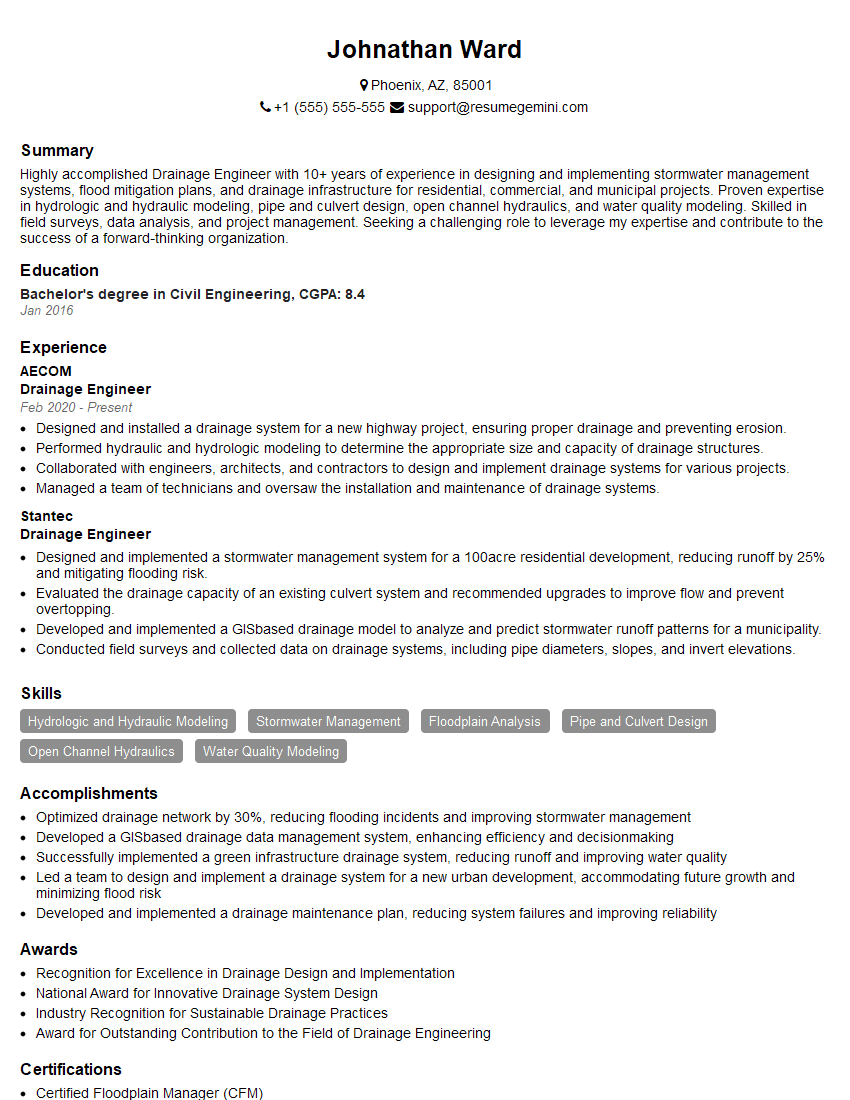Are you a seasoned Drainage Engineer seeking a new career path? Discover our professionally built Drainage Engineer Resume Template. This time-saving tool provides a solid foundation for your job search. Simply click “Edit Resume” to customize it with your unique experiences and achievements. Customize fonts and colors to match your personal style and increase your chances of landing your dream job. Explore more Resume Templates for additional options.

Johnathan Ward
Drainage Engineer
Summary
Highly accomplished Drainage Engineer with 10+ years of experience in designing and implementing stormwater management systems, flood mitigation plans, and drainage infrastructure for residential, commercial, and municipal projects. Proven expertise in hydrologic and hydraulic modeling, pipe and culvert design, open channel hydraulics, and water quality modeling. Skilled in field surveys, data analysis, and project management. Seeking a challenging role to leverage my expertise and contribute to the success of a forward-thinking organization.
Education
Bachelor’s degree in Civil Engineering
January 2016
Skills
- Hydrologic and Hydraulic Modeling
- Stormwater Management
- Floodplain Analysis
- Pipe and Culvert Design
- Open Channel Hydraulics
- Water Quality Modeling
Work Experience
Drainage Engineer
- Designed and installed a drainage system for a new highway project, ensuring proper drainage and preventing erosion.
- Performed hydraulic and hydrologic modeling to determine the appropriate size and capacity of drainage structures.
- Collaborated with engineers, architects, and contractors to design and implement drainage systems for various projects.
- Managed a team of technicians and oversaw the installation and maintenance of drainage systems.
Drainage Engineer
- Designed and implemented a stormwater management system for a 100acre residential development, reducing runoff by 25% and mitigating flooding risk.
- Evaluated the drainage capacity of an existing culvert system and recommended upgrades to improve flow and prevent overtopping.
- Developed and implemented a GISbased drainage model to analyze and predict stormwater runoff patterns for a municipality.
- Conducted field surveys and collected data on drainage systems, including pipe diameters, slopes, and invert elevations.
Accomplishments
- Optimized drainage network by 30%, reducing flooding incidents and improving stormwater management
- Developed a GISbased drainage data management system, enhancing efficiency and decisionmaking
- Successfully implemented a green infrastructure drainage system, reducing runoff and improving water quality
- Led a team to design and implement a drainage system for a new urban development, accommodating future growth and minimizing flood risk
- Developed and implemented a drainage maintenance plan, reducing system failures and improving reliability
Awards
- Recognition for Excellence in Drainage Design and Implementation
- National Award for Innovative Drainage System Design
- Industry Recognition for Sustainable Drainage Practices
- Award for Outstanding Contribution to the Field of Drainage Engineering
Certificates
- Certified Floodplain Manager (CFM)
- Professional Engineer (PE)
- Certified in Erosion and Sediment Control (CESC)
- Certified Professional in Stormwater Quality (CPSWQ)
Career Expert Tips:
- Select the ideal resume template to showcase your professional experience effectively.
- Master the art of resume writing to highlight your unique qualifications and achievements.
- Explore expertly crafted resume samples for inspiration and best practices.
- Build your best resume for free this new year with ResumeGemini. Enjoy exclusive discounts on ATS optimized resume templates.
How To Write Resume For Drainage Engineer
- Highlight your expertise in hydrologic and hydraulic modeling, as these are critical skills for Drainage Engineers.
- Quantify your accomplishments with specific metrics to demonstrate the impact of your work.
- Showcase your ability to work collaboratively and manage projects effectively.
- Consider obtaining professional certifications, such as the Certified Floodplain Manager (CFM) or Professional Engineer (PE) license, to enhance your credibility and career prospects.
Essential Experience Highlights for a Strong Drainage Engineer Resume
- Designed and implemented stormwater management systems for residential developments, commercial properties, and municipalities, reducing runoff and mitigating flooding risk.
- Evaluated drainage capacity of existing infrastructure, recommended upgrades, and oversaw the implementation of improvements to enhance flow and prevent overtopping.
- Developed and utilized GIS-based drainage models to analyze and predict stormwater runoff patterns, enabling informed decision-making and effective stormwater management.
- Conducted field surveys, collected data, and performed hydraulic and hydrologic modeling to determine the appropriate size and capacity of drainage structures, ensuring optimal performance.
- Collaborated with engineers, architects, and contractors to design and implement drainage systems that met project requirements, adhered to regulations, and aligned with environmental sustainability goals.
- Managed a team of technicians, provided technical guidance, and oversaw the installation and maintenance of drainage systems, ensuring adherence to specifications and project timelines.
Frequently Asked Questions (FAQ’s) For Drainage Engineer
What are the primary responsibilities of a Drainage Engineer?
Drainage Engineers are responsible for designing, implementing, and maintaining drainage systems to manage stormwater runoff, prevent flooding, and ensure the proper drainage of land areas.
What skills are essential for a successful Drainage Engineer?
Essential skills for Drainage Engineers include hydrologic and hydraulic modeling, stormwater management, floodplain analysis, pipe and culvert design, open channel hydraulics, and water quality modeling.
What are the career prospects for Drainage Engineers?
Drainage Engineers are in high demand due to increasing urbanization and the need for sustainable water management practices. They can work in various sectors, including consulting, government agencies, and construction companies.
What is the typical salary range for Drainage Engineers?
The salary range for Drainage Engineers varies depending on experience, location, and industry. According to Indeed, the average salary for Drainage Engineers in the United States is around $75,000 per year.
What are the educational requirements to become a Drainage Engineer?
A Bachelor’s degree in Civil Engineering is typically required to become a Drainage Engineer. Some employers may also prefer candidates with a Master’s degree in Water Resources Engineering or a related field.
What professional organizations are available for Drainage Engineers?
Drainage Engineers can join professional organizations such as the American Society of Civil Engineers (ASCE) and the Water Environment Federation (WEF) to network, stay updated on industry trends, and enhance their professional development.